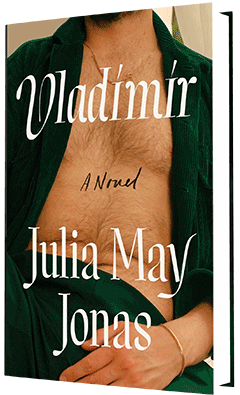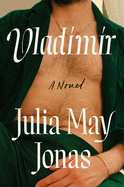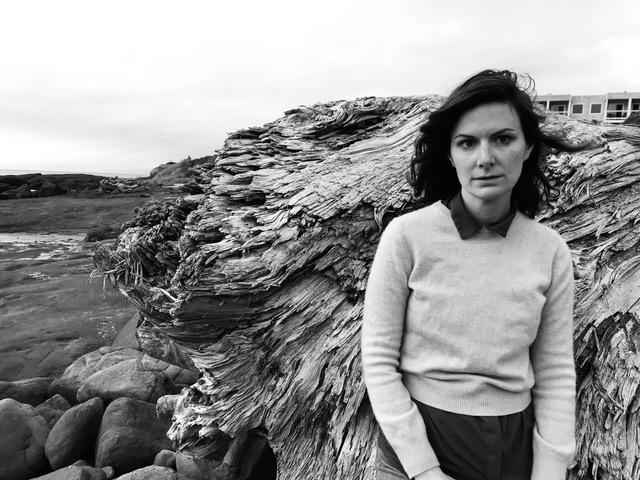Vladímír
by Julia May Jonas
Julia May Jonas's Vladímír is a compelling debut, discomfiting and riveting, and timely in its themes. With dark humor, pathos and sly references to art and literature, this smart, edgy novel challenges assumptions and forces fresh perspectives.
In small-town upstate New York, an unnamed narrator teaches English at a small college. She lives an easy enough life, reading, writing, teaching, exuding "Big Mom Energy" and enjoying the admiration of her students, whose earnest eagerness for improving the world she appreciates. Then a scandal erupts: her husband, John, chair of the English Department, is revealed to have had sexual relationships with a number of his former students. The narrator herself is quick to point out that these all took place before such relationships were explicitly forbidden. She and John had always had an understanding about their extramarital activities. She is surprised to find that her colleagues and students disapprove not only of John but of the narrator as well, and finds herself increasingly resentful: of John, of the academic machine, of her students and of herself.
Into this upheaval comes Vladimir Vladinski, newly hired junior professor and up-and-coming experimental novelist. Vladimir is 20 years or so the narrator's junior, sexy, flirtatious and married. The narrator is quickly captivated, then obsessed. A two-time novelist with generally disappointing reviews, she has largely turned to literary criticism and book reviews, but now feels inspired to write fiction again. For the first time she feels the work flowing from her effortlessly, and credits Vladimir as her muse. "There was a burning in my body, an extra level of excitement keeping part of me fed and running that required no sustenance. It was longing for the love of Vladimir." She writes, masturbates and surreptitiously follows Vladimir one day and her beleaguered husband the next, and then even Vladimir's wife--beautiful, traumatized, a masterful writer herself. Sexual, romantic, literary and workplace jealousies overlap. Things fall apart: John's hearing (people keep calling it a trial) at the college looms as their already distant and fractured relationship continues to crumble. Their adult daughter moves back home, in dual personal and professional crises of her own, which throws the narrator into new light as a mother. She neglects her work, becoming increasingly reckless until, consumed by her fantasies, she finally commits a shocking act that precipitates a life-changing event for all involved.
That this narrator is a 58-year-old woman is significant, and provides opportunities to consider issues of gender, age, societal and literary expectations and subversions. Her troubled body image provides an undertone from the very first pages, with near-constant references to weight control and her evening skin care regimen. "I prefer to conceal my neck," she confides, as she compulsively grooms and criticizes her body before each meeting with Vladimir. "A man could always make me feel worse than anything a woman could ever say to me," she reflects, as she struggles to align her own sexual revolution with the values of her students. Vladímír questions gender and generational tensions, and the intersection of art and morality within the bubble of academia. In the family, household and larger social realms, it addresses every permutation of human relationship and the relationship between power and desire, while also carrying a strong thread of disturbed body image and issues around aging. In other words, this novel is as varied and harried as life.
As a novel so rooted in English departmental affairs should be, Vladímír is also jam-packed with literary references. Vladimir is compared to Jay Gatsby. "Enraged at my vapidity," the narrator laments, "I forced myself to sit down and read several articles in the latest issue of the New York Review of Books." Insisting she's not jealous or bitter about her own novels' failure to impress, she notes however that "Margaret Atwood wrote exciting books that practically lived inside of a uterus." Vladimir's wife says of her own mental health struggles, that her story is "like Nurse Ratched, like Girl, Interrupted, like The Bell F**king Jar."
Jonas's narrator has a strong, assured voice, incisively thinking through her decisions and the surrounding issues while simultaneously--and with self-awareness--mucking up her life. The narrator and the novel take on any number of thorny topics. Were the college students who slept with John seizing agency and free love in an empowered, feminist stance? Or were they taken advantage of by an older man with the power structure on his side? What are the pros and cons of an open marriage? Is our cultural hang-up about intergenerational affairs perhaps a little overblown? Some of these questions and perspectives are decidedly uncomfortable, but Jonas consistently pushes those edges, leaning always away from easy answers and toward nuance. Vladímír's central characters are rarely likable but they are always captivating; this story harnesses formidable momentum to pull readers through even its most uncomfortable moments. It is a rare victory in a novel to wrestle with such prickly issues and yet be as entertaining as this. Jonas's prose is clear, forceful and unflinching, and highly sensual: food, drink and sex are ever-present and frankly, complexly evoked.
The narrator writes of Vladimir's own debut: "The book was funny, clear, awake, vivid. The prose was spare but the voice was not sacrificed in his exact word choice. It felt both like life and beyond life." The same comments might be made of Vladímír, a clear-eyed treatment of academia and the human condition. --Julia Kastner








